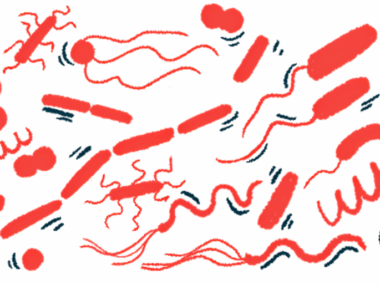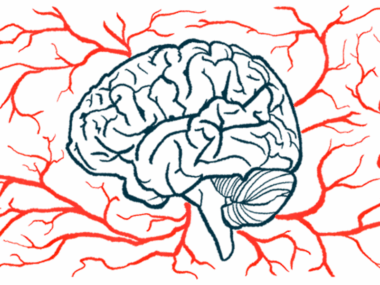Gut metabolite seen as potential Parkinson’s target: Researchers
High levels of molecule seen to improve motor function in worms
Written by |

Increasing levels of a gut metabolite — a molecule that results from the digestion of certain foods — eased neurodegeneration and improved motor function in a worm model of Parkinson’s disease, a study found.
Researchers identified a feedback loop in which nerve cell accumulation of alpha-synuclein, the protein that builds up and causes damage in Parkinson’s, drove a deficiency of the molecule propionate, and subsequent energy deficits in the gut that were then communicated back to the brain to exacerbate neurodegeneration.
Supplementing with propionate could put the brakes on that detrimental cycle.
In addition to positioning propionate as a possible therapeutic target in Parkinson’s, the findings support the idea that the gut-brain axis, a two-way line of communication between the central nervous system and the gastrointestinal tract, may influence the two systems’ function in health and disease.
The study, “Metabolic rescue of α-synuclein-induced neurodegeneration through propionate supplementation and intestine-neuron signaling in C. elegans,” was published in Cell Reports.
Gut-brain interaction in neurodegenerative diseases highlighted in study
The study “highlights the involvement of small-molecule metabolites in the gut-brain interaction in neurodegenerative diseases,” researchers from the University of Hong Kong said in a university press release.
Numerous studies show that Parkinson’s patients exhibit bacterial alterations in the intestines relative to healthy people, and that some of these changes seem to be associated with disease severity or progression.
The reasons intestinal changes might influence brain health are still being explored. Some researchers are focusing on short-chain fatty acids (SCFAs), a family of metabolites including propionate that are produced from chemical reactions within gut bacteria during digestion. The idea is that SCFAs may be able to influence brain health both indirectly by altering systemic levels of inflammation or directly by entering the brain and interacting with nerve cells.
Parkinson’s patients have diminished levels of SCFAs due to reductions in the bacteria that produce them, according to Chaogu Zheng, PhD, the study’s senior author. Zheng’s team previously found that bacterial genes related to vitamin B12 synthesis were linked to neurodegeneration in a worm model of Parkinson’s. Synthesis of vitamin B12 causes the breakdown of propionate, suggesting the possible involvement of this SCFA.
Returning to the worm Parkinson’s model, the researchers found that the animals had lower levels of propionate than healthy worms.
Depleting vitamin B12 from the worms’ diet as a way of increasing natural propionate levels or supplementing with external propionate suppressed neurodegeneration and improved motor function. Vitamin B12 itself, however, could block those benefits.
Eating more fiber could boost brain health, researcher says
“This study is interesting because it connects experimental findings in animal models of PD [Parkinson’s disease] with clinical observations,” said Zheng, an assistant professor at the University of Hong Kong.
“The low amount of SCFAs in PD patients may indeed contribute to disease progression and severity, and supplementing propionate through the diet may help treat the disease and improve the symptom,” Zheng said.
A series of experiments showed that alpha-synuclein accumulation in the worms’ nerve cells generated a stress response in the energy production centers (mitochondria) of intestinal cells.
That stress response led to metabolic disruptions that reduced propionate in the gut, causing reduced activity of propionate-sensitive genes, many of which are involved in cellular energy production.
Propionate supplementation was found to restore activity of those genes, improving mitochondrial function and energy production in the gut. Still, it wasn’t yet clear how these gut-related changes might be able to in turn influence neurodegeneration.
Our results suggest a potential positive feedback loop for the neuroprotective effects of propionate.
The scientists found that improved mitochondrial health in the intestines led to improved mitochondrial health in nerve cells.
“Our results suggest a potential positive feedback loop for the neuroprotective effects of propionate,” the researchers wrote.
Such a loop would mean that better energy production in the gut is communicated to the brain, improving energy production there and reducing the mitochondrial stress responses that contributed to diminished gut propionate in the first place.
A metabolic byproduct called lactate and other signaling peptides appeared to mediate this feedback loop, but the researchers emphasized that “neurodegeneration is likely regulated by a diverse array of secreted molecules.”
The role of propionate in stopping harmful feedback to the brain was found to happen downstream of alpha-synuclein, meaning SCFA does not directly mediate alpha-synuclein buildup, but rather the harmful effects it elicits after accumulating.
In human or rat cell models, propionate supplementation led to reduced neurodegeneration, suggesting that beyond gut-brain communication, propionate may have direct effects on brain health.
Because SCFAs are produced by bacteria when dietary fibers are being broken down, Zheng noted that eating more fiber-rich foods, such as seeds, nuts, fruits, and vegetables, could increase levels of propionate and other beneficial SCFAs, in turn boosting brain health.







